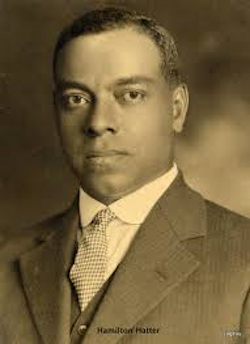
Hamilton Hatter, educator and inventor, was the first principal of Bluefield Colored Institute in Bluefield, West Virginia. Hatter was born enslaved on April 24, 1856, in Jefferson County, Virginia, which became part of West Virginia in 1863. His parents Frank and Rebecca Hatter, his maternal grandparents, William and Lettie McCord, and his paternal grandparents, James Hatter and Matilda Hatter, were enslaved. Despite their status, his parents and grandparents supported Hatter in pursuing his later academic achievements.
Young Hatter attended school in his hometown, Charles Town, West Virginia. In addition to his regular school studies, he learned carpentry, house framing, and became a skilled mechanic who could construct machines and make plows. He continued this work into his adult life and in 1893, at the age of 37, received the patent for an intricate machine that improves the harvesting of Indian corn.
Hatter enrolled in Storer College in Harper’s Ferry, West Virginia, graduating in 1878. As was often the case with the brightest students who attended the new black colleges, he was asked to teach in the academic department. His maternal grandparents, the McCords, funded additional education at the Nichols Latin School in Lewiston, Maine, and Hatter received his certificate of completion in 1883.
Hatter spent the next five years in New England, and during that period he enrolled at Bates College, while managing a saw mill, and graduated in 1888 with an A.B. degree.
Returning to Harper’s Ferry that year, Hatter rejoined the faculty at Storer College, where he taught Latin, Greek, and Mathematics. He also started the Storer Industrial Department and oversaw the construction of the main campus. Three years after his return, Hatter was named to the Storer College Board of Trustees, serving until 1906.
In 1895, taking advantage of the Second Morrill Act which provided federal funds for the creation of African American colleges, West Virginia Senator William M. Mahood sponsored a bill which established Bluefield Colored Institute. Bluefield, West Virginia was selected because it was within 100 miles of 70 percent of West Virginia’s black citizens.
One year later, Bluefield Colored Institute opened, and West Virginia Governor Virgil A. Lewis appointed Hamilton Hatter as its first principal. He served in that capacity until 1906. While there he oversaw the construction of Mahood Hall, the administrative building, as well as Lewis Hall and West Hall dormitories. Bluefield Colored Institute grew from 40 students, when Hatter became principal, to over 180 when he retired.
Hatter was also politically active. In 1892, he became the first African American in West Virginia to receive the Republican nomination for the West Virginia House of Delegates. He frequently attended county, state and national GOP Conventions and campaigned for other party candidates.
During World War I, Hatter was authorized by Democratic President Woodrow Wilson to be a “Four Minute Man.” During the four-minute intermission at theaters, these men would stand before audiences and speak in support of the president’s policies.
Hamilton Hatter died on September 21, 1942, at the age of 86. He was buried in Oak Grove Cemetery, Bluefield, West Virginia.
On December 3, 1999, the president’s house at Bluefield College was placed on the National Register of Historic Places. In 2000, Bluefield College renamed the official residence the Hamilton Hatter House.

